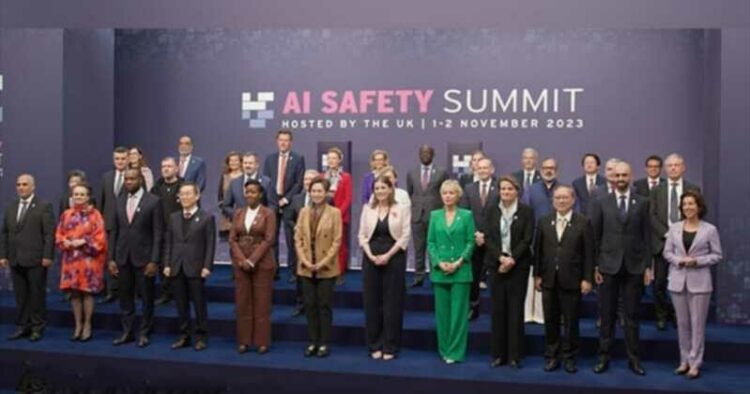India, along with 27 other countries and the European Union, signed a declaration at a meeting in the United Kingdom pledging to work together to assess the risks associated with Artificial Intelligence (AI).
The countries represented were Australia, Brazil, Canada, Chile, China, France, Germany, India, Indonesia, Ireland, Israel, Italy, Japan, Kenya, Saudi, Arabia, Netherlands, Nigeria, The Philippines, the Republic of Korea, Rwanda, Singapore, Spain, Switzerland, Turkey, Ukraine, United Arab Emirates, United Kingdom of Great Britain and Northern Ireland, the United States of America, and the European Union.
Taking to social media platform X, the official page for Prime Minister Rishi Sunak’s office said, “Leading AI nations have reached a world-first agreement on AI Safety.”
🆕 Leading AI nations have reached a world-first agreement on AI Safety.
The Bletchley Park Declaration sees 28 countries agree opportunities, risks and the need for international action on frontier AI, systems that pose the most urgent and dangerous risks ⬇️
— UK Prime Minister (@10DowningStreet) November 1, 2023
“The Bletchley Park Declaration sees 28 countries agree on opportunities, risks and the need for international action on frontier AI, systems that pose the most urgent and dangerous risks,” it added.
The UK Government on November 1 issued a statement titled “The Bletchley Declaration”, which was signed by delegates from the 28 participating nations–including the EU– and issued a dire warning about the threats presented by the most sophisticated “frontier” artificial intelligence systems.
“Artificial Intelligence presents enormous global opportunities: it has the potential to transform and enhance human well-being, peace and prosperity. To realise this, we affirm that, for the good of all, AI should be designed, developed, deployed, and used, in a manner that is safe, in such a way as to be human-centric, trustworthy and responsible,” the declaration read.
The Bletchley Park declaration also noted the importance of AI systems in various domains of daily routine like housing, employment, transport, education, health, accessibility, justice and added that their use is likely to see an ascent.
“We recognise that this is, therefore, a unique moment to act and affirm the need for the safe development of AI and for the transformative opportunities of AI to be used for good and for all, in an inclusive manner in our countries and globally,” it read.
“Alongside these opportunities, AI also poses significant risks, including in those domains of daily life. To that end, we welcome relevant international efforts to examine and address the potential impact of AI systems in existing fora and other relevant initiatives, and the recognition that the protection of human rights, transparency and explainability, fairness, accountability, regulation, safety, appropriate human oversight, ethics, bias mitigation, privacy and data protection needs to be addressed,” it added.
The AI risk will be addressed on both national and international levels and will lay emphasis on identifying AI safety risks of shared concern and building a shared scientific and evidence-based understanding of these risks.
“In furtherance of this agenda, we resolve to support an internationally inclusive network of scientific research on frontier AI safety that encompasses and complements existing and new multilateral, plurilateral and bilateral collaboration, including through existing international fora and other relevant initiatives, to facilitate the provision of the best science available for policy making and the public good,” the declaration stated further.
Union Minister of State for Electronics and IT Rajeev Chandrasekhar, in his address at the world’s first global Summit on Artificial Intelligence in the UK on November 1, said India looks at AI with a prism of openness, safety, trust and accountability.
Addressing the ‘AI Safety Summit 2023’, Rajeev Chandrasekhar said India has maintained that international collaborations and international conversations were extremely important at a time and a year when “technology is throwing up most exciting opportunities ever in the history of mankind.”
The Minister emphasised that India sees AI as “the next big opportunity.”
“We are extremely clear in our minds on mitigation on what AI and indeed any emerging technology can and will represent, a prism of openness, safety, trust and accountability,” he said.
The Union Minister noted that Prime Minister Narendra Modi had for years argued that the future of tech, be it innovations or partnerships or the institutional framework for regulating the tech and innovations for the common good for all mankind should be driven by a coalition of nations rather than one country or two countries an institutional framework is a lot more sustainable.
“The Indian digital economy and the innovation economy and ecosystem today is growing by two and a half to three times faster than the non-digital part of the GDP. AI is a kinetic enabler of the already accelerating digital economy, innovation, growth, and Governments,” the Minister said.
Meanwhile, tech billionaire and CEO of X Elon Musk was among those who were seen at the two-day Summit led by UK Prime Minister Rishi Sunak that began yesterday at the historic Bletchley Park in Buckinghamshire.
According to the UK Government, the Summit’s objectives are for participants to “work towards a shared understanding of risks” posed by AI and organise a global effort to mitigate them.
(with inputs from ANI)



















Comments